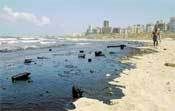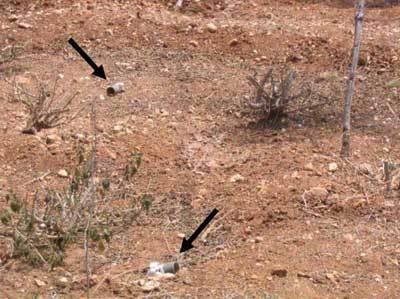
The fighting in Lebanon has stopped, but the killing of children and other civilians continues because of the bombing campaign Israeli forces launched during the final days of last month's conflict. The Palm Beach Post reports:
According to the United Nations, the Associated Press and Israel's Haaretz newspaper, the Israelis fired 90 percent of their munitions during the three days before the U.N. cease-fire took effect on Aug. 14.
By any measure, it was an extraordinary barrage. With conventional artillery, rockets and air strikes, the Israelis sent hundreds of U.S.-made cluster bombs into towns and cities. Each bomb contained hundreds of bomblets, fist-sized grenades that scattered over an area the size of a football field. Estimates are that the Israelis fired 1.2 million bomblets into South Lebanon during those last hours of fighting.
The bomblets' failure rate can run as high as 40 percent, and there could be close to a half-million of them still waiting to go off and maim or kill anyone who's standing within range.
According to the U.N., the bomblets have killed or wounded an average of three people daily since the cease-fire. At least 15 people have been killed and more than 100 others wounded, and about a third of the casualties have been children. Among the dead are five bomb disposal experts. Before today is over, someone is all but certain to be blown apart by one of the Israelis' lethal leftovers.
The aftermath was not surprising. Cluster bombs have had the same failure rates in Kosovo, Afghanistan and Iraq. The Israelis knew what they were leaving behind and knew the loss of life that would go on for months.
The justification Israel rightly claimed to defend itself against Hezbollah did not include a license to inflict random civilian casualties. In news conferences beamed to the world last month, Israeli military officials talked of surgical strikes that took painstaking precautions to avoid hitting civilian targets. The idea that the new millennium has opened an era of high-tech warfare in which only the bad guys get hurt is a comforting myth that Americans, in particular, would like to believe. Ask the Iraqis what they think of surgical warfare, and you'll learn the Arab word for oxymoron.
But the Israelis' calculated decision to use cluster bombs, which are designed to inflict multiple human casualties, in populated areas of south Lebanon is a failure of conscience that makes accomplices of the American people. It is unclear whether Israel violated an agreement with the United States not to use cluster bombs against civilians. But it is very clear that the United States and Israel lose the moral high ground in assailing terrorist groups such as Hezbollah when suicide bombers and nations that cluster-bomb school playgrounds become indistinguishable in the eyes of the world.
Not only has Israel left an indiscriminate swath of death and dismemberment across Lebanon, it also is refusing to help clean up the mess.
The United Nations has asked the Israelis to hand over the coordinates of the cluster-bomb attacks to assist bomb removal teams that have years of work ahead of them. But David Shearer, the U.N. Humanitarian Coordinator in Lebanon, says the Israelis "haven't yet been forthcoming."
"What we'd like is the number of shells that were fired in and the actual coordinates so we can go in and short-circuit what we're doing now and go find those munitions," Mr. Shearer told the AP. "But that has not happened."
Besides the immediate danger, the unexploded bomblets have the long-term effect of damaging an already weak economy. Farmers are unable to work their fields, and demolition crews trying to remove housing rubble run the risk of triggering explosives buried in the debris. U.N. officials say it will be 2008 before the economy can begin to repair itself.
The Israelis come out losers in any conflict they don't win outright. Hezbollah has gained more radical followers. The United States has thousands of its bomblets scattered across Lebanon. The final toll of this 34-day fight will take years to calculate.
From EuroNews:
How to deal with a massive oil spill left behind from the Israel-Hizbollah conflict has been the focus of talks in Greece. Up to 15,000 tonnes of oil has polluted the Lebanese coastline after the bombing of a power station, and the UN has set up talks on what can be done to stop the pollution spreading.
The talks, near Athens, are being led by the UN Environment Programme, and will include representatives from Lebanon, Syria, Greece, Turkey and the EU. Among those eager to see the clean-up pick up pace are fishermen in the small town of Byblos, 35 kilometres north of Beirut. They have been forced to stay in harbour for more than a month.

The Israeli airstrike on a coastal power plant in mid-July spilled up to 110,000 barrels of fuel oil. The devastation rivals that in Prince William Sound after the Exxon Valdez disaster:
Shovel-wielding volunteers sifted through oil-stained sand on a beach where tourists once swam, now emptied by a massive spill caused by Israeli bombardment. Two months later, only 3 percent of the oil has been recovered.
"It's going to take a year before it's back to normal," said Cmdr. Christian Nedelec, the head of an eight-person French team that has been helping the Lebanese government clean up the slick.
Lebanon's tourist and fishing industries remain battered by what has been described as the country's worst environmental catastrophe, which erupted when Israeli warplanes struck the Jiyeh power plant in mid-July, spilling up to 110,000 barrels of fuel oil into the clear Mediterranean waters.
Fewer than 3,500 barrels have been cleaned up. Lebanon couldn't start any offshore operation for weeks, waiting for Israel to lift its naval and air blockade on Sept. 8.
Around two-thirds of Lebanon's picturesque Mediterranean coast has been fouled by the oil slick, which extends about 95 miles and has reached Syria's shoreline to the north.
"The timing is quite essential with an oil spill. The more you wait, the more it spreads," said Luisa Colasimone of the United Nations Environmental Program.
Last week, 20 volunteers were cleaning up the black gunk that tarred the 1.1-mile-long beach, Ramlat el-Baida — Arabic for "white sand." The only public beach within about 60 miles of the capital, it is usually crowded with locals and tourists on summer weekends.
Tarek Moukaddem, 18, has come six or seven times to help clean, traveling by bus from his hometown north of Beirut.
"I usually spend all my time here. I'm here to clean it so I can come here with my friends and swim next summer," he said.
The airstrike at Jiyeh destroyed six fuel tanks at the plant. Israel said it hit the site, 12 miles south of Beirut, as part of a broader campaign against infrastructure used by Hezbollah guerrillas. Many Lebanese accuse it of hitting the station and other sites with few ties to Hezbollah simply to punish the country and force the government to take action against the guerrillas.
Israel insists the circumstances of the spill are unclear and it has not accepted responsibility.
"It's not clear that Israel was directly responsible for the oil slick. We certainly did not intentionally attack the oil containers," said Israeli Foreign Ministry spokesman Mark Regev.
Israel's chutzpah takes my breath away.
That explanation is of scant consolation to Mohamed Itani, 35, a Beirut fisherman who has not been out to sea in his boat since the spill, and is struggling to support his 7-year-old twin sons and his wife, who is expecting a third child.
He sat idly drinking tea, looking despondently at the thick, black sludge that has blocked the small fishing port.
Along the length of Lebanon's coast, usually visited by hundreds of thousands of tourists every year, more than 30 sandy beaches and rocky coves are covered with oil.
Lebanon's archaeological heritage also has suffered. Some 25 miles north of Beirut in the ancient Phoenician port city of Byblos, whose history stretches back 7,000 years, famous ruins were blackened by the slick.
The oil seeped into the foundation of the medieval harbor wall, staining the stones of the two ancient towers at the port's entrance. U.N. experts warn that the site will have to be cleaned for 10 weeks with hand brushes — before winter to prevent permanent damage.
It is marine life that could suffer the worst consequences, because in the Mediterranean, currents don't come in often enough to sweep away pollutants.
Lebanese waters are known as a passage for migrating fish, particularly tuna. The oil, which sank to the bottom of the sea, where it threatens plants and fish that live on the sea floor, could resurface unless treated and contaminate the coast for years to come.
It could take up to 10 years for the ecosystem of the eastern Mediterranean to recover fully, according to the country's environment minister, Yaacoub Sarraf.
Several countries including France, Spain and Italy have sent teams to help the Lebanese navy with the cleanup, which could cost $100 million.
Lebanon, meanwhile, plans to sue Israel for damages, though it has not said how much it will claim.
Israel and the U.S. should be cleaning this mess up. Obvious we (U.S.) and Israel can't for security reasons. But only when that happens, when Americans and Israelis stop aggressive, preemptive and out-of-proportion military engagement, will we be on the right path and building peace and democracy in the region. And that's not going to happen until Republicans are out of control of Congress (in the short term, to block further Bush-Cheney dreams of Empire) and Bush-Cheney are out of the White House in the slightly later term.
Go here for more on the environmental devastation ongoing in the region.
Filed under: Israel, U.S., Lebanon, Syria, environment, economy, oil spill, cluster bombs


No comments:
Post a Comment